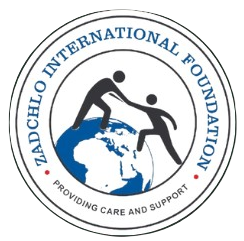Our Focus: Primary Thematic Areas
In order to effectively engage these components, our programmatic interventions have been streamlined into Six thematic areas:
Healthcare
Based on global best practice, we have designed and provided a range of critical interventions to vulnerable women and girls: improve access to sexual reproductive health (SRH); provision of preventive, testing (HIV testing services – HTS) and treatment services (of HIV/AIDS), as well as elimination of mother to child transmission of HIV; provide care and support to people living with HIV/AIDS and Tuberculosis (TB); facilitate treatment and rehabilitation for PWUID; pursue effective prosecution against Gender Based Violence (GBV), promote Strategic Behavioral Change Communication (SBCC) for malaria, malnutrition, and teenage pregnancy.
Civic Engagement, Gender and Human Right
At Zadchlo International Foundation, we strongly believe in the principles of fundamental human rights, the fight against gender base violence, social stigma, prejudice and discrimination. We also recognize that advocacy is an effective strategy for influencing public opinion, shaping policy and inspiring positive action. Our work therefore – the ultimate goal being the restoration of rights and dignity of vulnerable people in our society, irrespective of their socio-economic status – relies on a lot of engagement, enlightenment, and raising awareness. This is why advocacy is an important pillar of our foundation, broadly speaking, and of Civic Engagement in particular.
Through Civic Engagement, we have been involved in social mobilization and peer monitoring, with the aim of encouraging voluntary counseling and testing among members of key populations as part of our HIV/AIDS sensitization campaigns. We have also been involved in social causes including the advocacy for peaceful coexistence, peacebuilding, and religious harmony. Other goals of this intervention include raising awareness about citizens’ rights and responsibilities, supporting voter education, championing values reorientation, and fighting against criminality like trafficking in persons and human smuggling.
Given the low level of information about rights issues, it is imperative that members of society who are ignorant about the basics of human rights are educated about the fact that such rights are foundational for societal development and peaceful coexistence, and that human dignity actually constitutes the basis for fundamental human rights, and that both of these rights are inviolable.
Empowerment (through Skills Training)
The profile of our primary leads is that they are socioeconomically disadvantaged and stigmatized (and in extreme cases ostracized), and therefore NOT only in need of medical care and support, but also capacity development and financial empowerment.
What we achieve through skills training is empowerment of the vulnerable girls and women, catered for by our foundation. We identify and provide economically viable (practical) and culturally acceptable, gender-sensitive trainings designed to build their capacities and develop their competencies for high job performance and profitability in small or medium scale enterprises. Thereafter, we support them with startup kits, so that they can engage in income-generating activities or businesses, feed themselves, take care of other needs, and even provide for members of their families.
Education of orphans and vulnerable children
For many orphans and vulnerable children (OVC), several factors truncate their educational pursuits, most notable being poverty, high school fees and cost of learning materials that they cannot afford, hunger, family illnesses (like HIV/AIDS), abuse, stigma and discrimination. OVCs are therefore more likely than other children to lose out on education. The design for this initiative is a back-to-school program for OVCs, especially the girl-child. This is foundational to any other aspect of their development.
Leadership Development Initiative
An equally important component of their training is in the area of leadership development. This training is important because OVCs are often raised in environments and conditions which affects their social, emotional and mental development negatively. And this often results in a deficient character development. The Leadership Development Initiative is designed to address these deficiencies and instill in them the qualities that are characteristic of good leaders.
Counselling, Rehabilitation, Care and Support
Social challenges have given rise to social stigma. This is expressed through negative attitudes which are associated with prejudice and discrimination. A good example is the HIV/AIDS stigma faced by people living with HIV/AIDS (PLWHA). Through this initiative, we provide interventions which are targeted at improving the wellbeing of PLWHA and their caregivers. The package includes healthcare, protection, education, nutrition, and hygiene.
We also provide psychosocial support and counselling for those facing stigma, prejudice or discrimination, as well as palliative and terminal care for end stage HIV, so that such people can live their last days with dignity.
